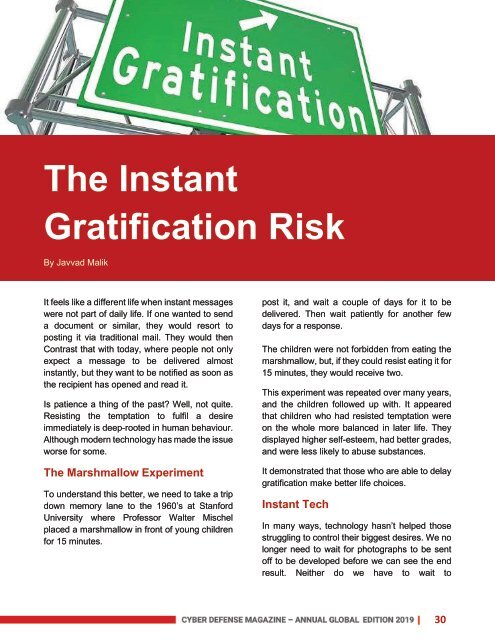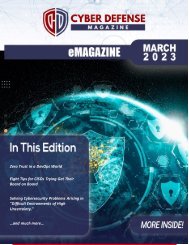Cyber Defense Magazine Global Edition for 2019
Cyber Defense Magazine's Annual Global Edition for 2019: Will Quantum resilient encryption change the future against breaches in our favor? Can deception technology stop the next wave of cybercriminals? This and much more inside this 78 page eMagazine exclusively distributed at www.ipexpoeurope.com each year along with our announcement of the Cyber Defense Global Awards winners for 2019; also found at www.cyberdefenseawards.com.
Cyber Defense Magazine's Annual Global Edition for 2019: Will Quantum resilient encryption change the future against breaches in our favor? Can deception technology stop the next wave of cybercriminals? This and much more inside this 78 page eMagazine exclusively distributed at www.ipexpoeurope.com each year along with our announcement of the Cyber Defense Global Awards winners for 2019; also found at www.cyberdefenseawards.com.
Create successful ePaper yourself
Turn your PDF publications into a flip-book with our unique Google optimized e-Paper software.
The Instant<br />
Gratification Risk<br />
By Javvad Malik<br />
It feels like a different life when instant messages<br />
were not part of daily life. If one wanted to send<br />
a document or similar, they would resort to<br />
posting it via traditional mail. They would then<br />
Contrast that with today, where people not only<br />
expect a message to be delivered almost<br />
instantly, but they want to be notified as soon as<br />
the recipient has opened and read it.<br />
Is patience a thing of the past? Well, not quite.<br />
Resisting the temptation to fulfil a desire<br />
immediately is deep-rooted in human behaviour.<br />
Although modern technology has made the issue<br />
worse <strong>for</strong> some.<br />
The Marshmallow Experiment<br />
To understand this better, we need to take a trip<br />
down memory lane to the 1960’s at Stan<strong>for</strong>d<br />
University where Professor Walter Mischel<br />
placed a marshmallow in front of young children<br />
<strong>for</strong> 15 minutes.<br />
post it, and wait a couple of days <strong>for</strong> it to be<br />
delivered. Then wait patiently <strong>for</strong> another few<br />
days <strong>for</strong> a response.<br />
The children were not <strong>for</strong>bidden from eating the<br />
marshmallow, but, if they could resist eating it <strong>for</strong><br />
15 minutes, they would receive two.<br />
This experiment was repeated over many years,<br />
and the children followed up with. It appeared<br />
that children who had resisted temptation were<br />
on the whole more balanced in later life. They<br />
displayed higher self-esteem, had better grades,<br />
and were less likely to abuse substances.<br />
It demonstrated that those who are able to delay<br />
gratification make better life choices.<br />
Instant Tech<br />
In many ways, technology hasn’t helped those<br />
struggling to control their biggest desires. We no<br />
longer need to wait <strong>for</strong> photographs to be sent<br />
off to be developed be<strong>for</strong>e we can see the end<br />
result. Neither do we have to wait to<br />
30


















